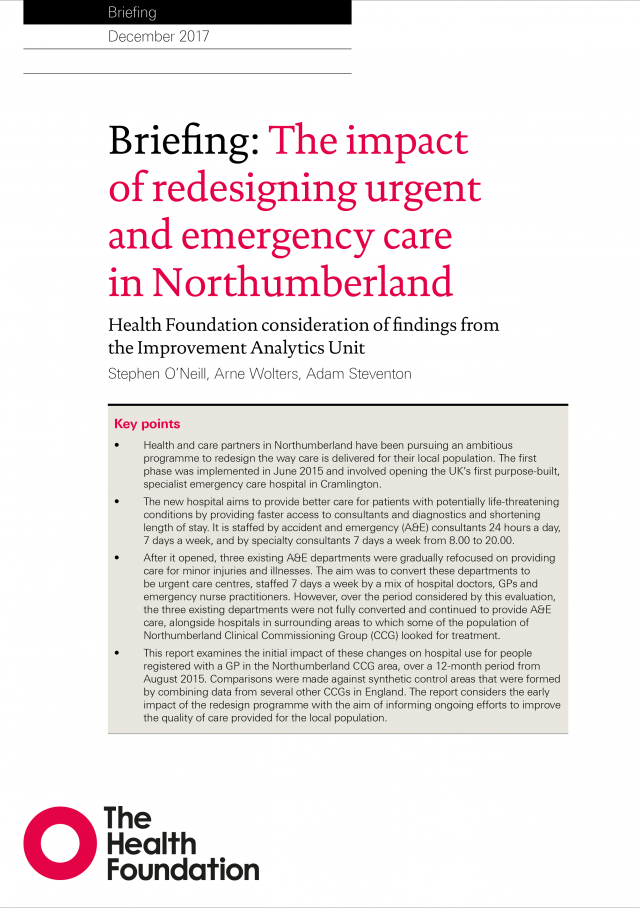The impact of redesigning urgent and emergency care in Northumberland Health Foundation consideration of findings from the Improvement Analytics Unit
December 2017

Key points
-
Health and care partners in Northumberland have been pursuing an ambitious programme to redesign the way care is delivered for their local population. The first phase was implemented in June 2015 and involved opening the UK’s first purpose-built, specialist emergency care hospital in Cramlington.
-
The new hospital aims to provide better care for patients with potentially life-threatening conditions by providing faster access to consultants and diagnostics and shortening length of stay. It is staffed by accident and emergency (A&E) consultants 24 hours a day, 7 days a week, and by specialty consultants 7 days a week from 8.00 to 20.00.
-
After it opened, three existing A&E departments were gradually refocused on providing care for minor injuries and illnesses. The aim was to convert these departments to be urgent care centres, staffed 7 days a week by a mix of hospital doctors, GPs and emergency nurse practitioners. However, over the period considered by this evaluation, the three existing departments were not fully converted and continued to provide A&E care, alongside hospitals in surrounding areas to which some of the population.
-
The changes to urgent and emergency care were associated with a 13.6% increase in A&E visits for people registered with a general practice in Northumberland CCG. On average, their A&E visits were 14.3 minutes shorter than would have been expected for Northumberland. Indeed, 91.8% of patients in Northumberland were admitted, transferred or discharged within 4 hours of attending A&E, compared with 85.2% in the control area. The analysis did not find evidence of impact on admission rates, and it was not possible to determine whether the changes to service delivery had any impact on length of stay.
-
Further research is needed to understand why patient activity changed in this way, as there are several possible explanations for these findings. The increased A&E activity may reflect perceived improvements in the quality of care provided, as well as the increase in the number of departments providing A&E care. This could have made A&E a more attractive or convenient place to obtain treatment. The reductions in A&E waiting times might also have reflected improvements to care processes.
-
More qualitative data on the underlying mechanisms of the care processes are needed to be able to better understand the implications of the findings for the delivery of health care. Further quantitative evaluation is also important, because complex changes to health care rarely have the intended impacts on outcomes in the short term, and further course correction is often needed.
The Health Foundation has considered findings from analysis into the early impact of changes to urgent and emergency care services in Northumberland following the opening of the country’s first bespoke emergency hospital in 2015 – the Northumbria Specialist Emergency Care Hospital in Cramlington.
The analysis was conducted by the Improvement Analytics Unit, a statistical evaluation unit run in partnership by NHS England and the Health Foundation that helps to inform decision-making at a local and national level and ultimately improve the delivery of health care. The work was conducted in collaboration with the Northumberland primary and acute care system vanguard, which includes Northumberland Clinical Commissioning Group (CCG) and Northumbria Healthcare NHS Foundation Trust.
The report highlights that reconfiguring NHS services takes time to generate the intended results and that robust, repeat evaluation can help to inform decisions and improvement.
Download the technical appendix
Further reading
Work with us
We look for talented and passionate individuals as everyone at the Health Foundation has an important role to play.
View current vacanciesThe Q community
Q is an initiative connecting people with improvement expertise across the UK.
Find out more

